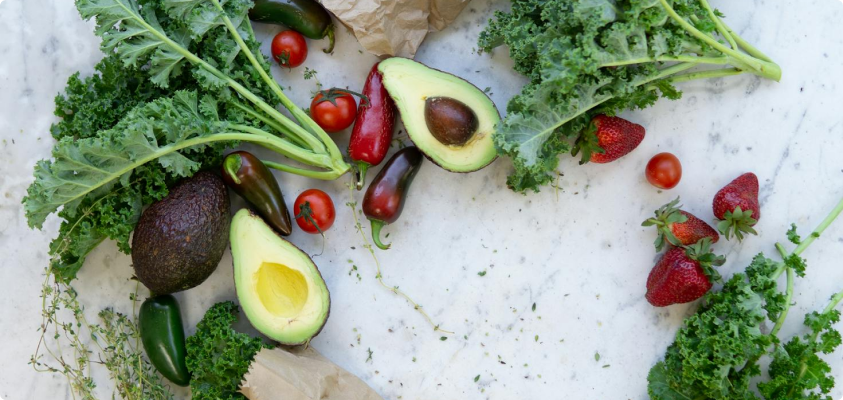1. Organic Fruits
Apples:
- Why: Apples often top the list of fruits with high pesticide residues.
- Organic Benefit: Reduces exposure to harmful chemicals.
Berries:
- Examples: Strawberries, blueberries, raspberries.
- Why: Berries are frequently treated with pesticides.
- Organic Benefit: Organic varieties are free from synthetic pesticides and are often fresher.
Avocados:
- Why: Avocados are known for their high fat content, which can absorb pesticides.
- Organic Benefit: Choosing organic helps reduce chemical exposure and supports better soil health.
2. Organic Vegetables
Leafy Greens:
- Examples: Spinach, kale, lettuce.
- Why: Leafy greens are often sprayed with pesticides and have a high surface area for chemical absorption.
- Organic Benefit: Organic greens are free from synthetic pesticides and often more nutrient-dense.
Tomatoes:
- Why: Tomatoes are frequently treated with pesticides and herbicides.
- Organic Benefit: Organic tomatoes are grown without synthetic chemicals, making them a healthier choice.
Bell Peppers:
- Why: Bell peppers are known for having high pesticide residues.
- Organic Benefit: Organic bell peppers offer a cleaner option and better flavor.
3. Organic Dairy and Eggs
Milk:
- Why: Organic milk comes from cows that are not treated with synthetic hormones or antibiotics.
- Organic Benefit: It often contains higher levels of beneficial nutrients like omega-3 fatty acids.
Eggs:
- Why: Organic eggs come from hens that are fed organic feed and are not exposed to antibiotics or synthetic hormones.
- Organic Benefit: They tend to have higher levels of certain nutrients and are produced in more humane conditions.
4. Organic Grains and Legumes

Quinoa:
- Why: Organic quinoa is grown without synthetic pesticides and fertilizers.
- Organic Benefit: It is a nutrient-dense, high-protein grain with fewer contaminants.
Oats:
- Why: Oats can be heavily processed with synthetic chemicals.
- Organic Benefit: Organic oats are grown without pesticides and are often less processed.
Beans and Lentils:
- Examples: Black beans, chickpeas, green lentils.
- Why: Organic legumes are less likely to be treated with chemicals and are grown using sustainable practices.
- Organic Benefit: They offer a cleaner source of plant-based protein.
5. Organic Meat and Poultry
Chicken:
- Why: Organic chicken is raised without antibiotics or hormones and is fed organic feed.
- Organic Benefit: Provides a cleaner, more ethically raised source of meat.
Beef:
- Why: Organic beef comes from cattle that are not given antibiotics or growth hormones and are raised on organic feed.
- Organic Benefit: Organic beef tends to be more humane and environmentally friendly.
6. Organic Snacks and Pantry Staples
Nuts and Seeds:
- Examples: Almonds, chia seeds, flaxseeds.
- Why: Organic nuts and seeds are free from pesticides and are often more sustainably grown.
- Organic Benefit: They are a healthier option for snacking and cooking.
Olive Oil:
- Why: Organic olive oil is less likely to be adulterated with other oils and is produced without synthetic pesticides.
- Organic Benefit: It offers a purer taste and supports better farming practices.
Granola and Cereal:
- Why: Organic versions are made with non-GMO ingredients and free from artificial additives.
- Organic Benefit: Provides a cleaner option for breakfast and snacking.
7. Organic Beverages
Coffee:
- Why: Coffee is heavily treated with pesticides and synthetic fertilizers.
- Organic Benefit: Organic coffee is grown without synthetic chemicals and often has a richer flavor.
Tea:
- Why: Organic tea is free from pesticides and chemical fertilizers.
- Organic Benefit: It offers a purer taste and supports better farming practices.
Conclusion
Choosing organic foods can be a great way to support healthier eating habits, reduce your exposure to harmful chemicals, and promote sustainable agriculture. By focusing on these top organic foods, you can make informed choices that benefit both your health and the environment. Whether you’re shopping for fruits, vegetables, grains, or snacks, incorporating organic options into your diet can lead to better overall well-being.
